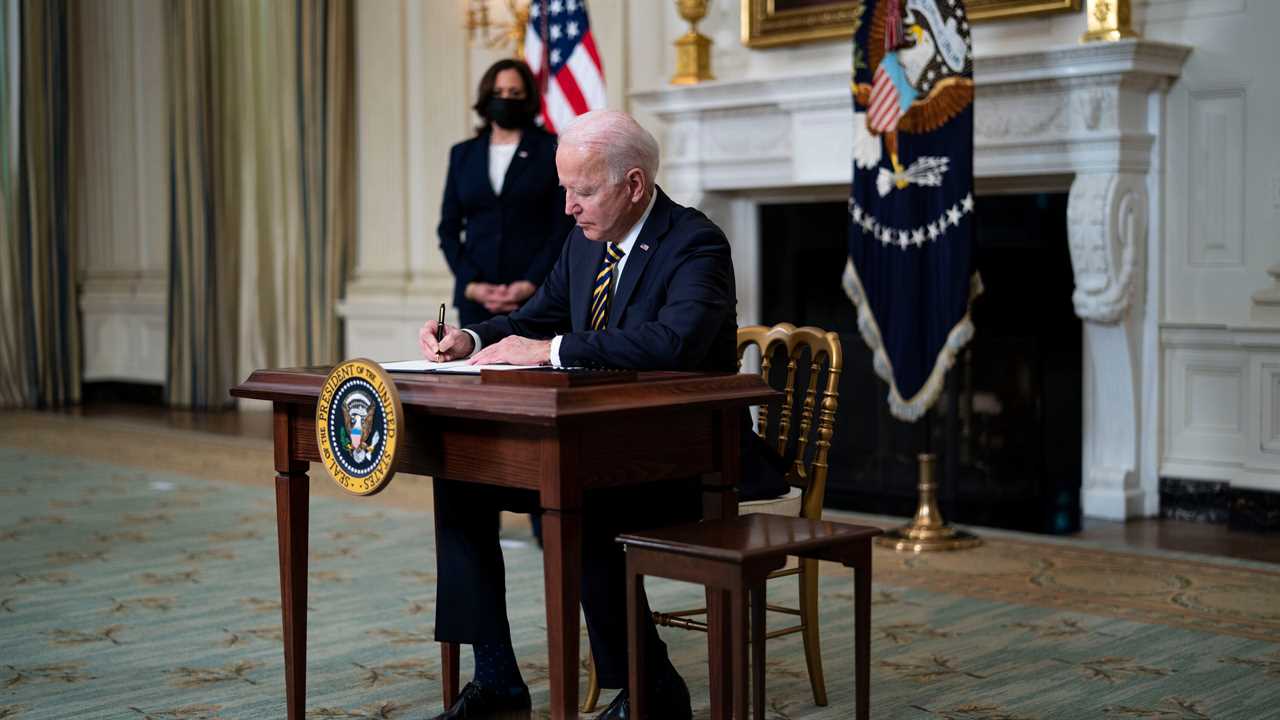
WASHINGTON — Automakers have been forced to halt production because of a lack of computer chips. Health care workers battling the coronavirus pandemic had to make do without masks as the United States waited on supplies from China. And pharmaceutical executives worried that supplies of critical drugs could dry up if countries tried to stockpile key ingredients and block exports.
Deep disruptions in the global movement of critical goods during the pandemic prompted President Biden on Wednesday to take steps toward reducing the country’s dependence on foreign materials. He issued an executive order requiring his administration to review critical supply chains with the aim of bolstering American manufacturing of semiconductors, pharmaceuticals and other cutting-edge technologies.
In remarks at the White House, the president cast the move as an important step toward creating well-paying jobs and making the economy more resilient in the face of geopolitical threats, pandemics and climate change.
“This is about making sure the United States can meet every challenge we face in the new era,” he said.
But the effort, which has bipartisan support, will do little to immediately resolve global shortages, including in semiconductors — a key component in cars and electronic devices. A lack of those components has forced several major American auto plants to close or scale back production and sent the administration scrambling to appeal to allies like Taiwan for emergency supplies.
Administration officials said the order would not offer a quick fix but would start an effort to insulate the American economy from future shortages of critical imported components.
Mr. Biden discussed the issue in the Oval Office on Wednesday afternoon with nearly a dozen Republican and Democratic members of Congress. Senator Chuck Schumer, Democrat of New York and the majority leader, called for the crafting and passage of a bill this spring to address supply chain vulnerabilities.
“Right now, semiconductor manufacturing is a dangerous weak spot in our economy and in our national security,” Mr. Schumer said. “Our auto industry is facing significant chip shortages. This is a technology the United States created; we ought to be leading the world in it. The same goes for building-out of 5G, the next generation telecommunications network. There is bipartisan interest on both these issues.”
Republicans emerged from the White House meeting optimistic that such efforts could soon move forward. Representative Michael McCaul, Republican of Texas, said he was pleased to see that the White House made the issue a top priority and that the president was receptive. “His words were, ‘Look, I’m all in,’” he said.
Mr. McCaul said that much of the conversation revolved around legislation that Congress had passed last year to incentivize the chips industry — but which still needs funding for research grants and a refundable investment tax credit — as well as the current chips shortage and possible looming job losses in the auto industry.
“China is looking at investing $1 trillion in their digital economy,” Mr. McCaul said. “If we’re going to be competitive, we have to incentivize these companies to manufacture these advanced chips in the United States.”
Mr. Biden called the meeting one of the best of his presidency so far. “It was like the old days,” he said. “People were actually on the same page.”
The president ordered yearlong reviews of six sectors and a 100-day review of four classes of products where American manufacturers rely on imports: semiconductors, high-capacity batteries, pharmaceuticals and their active ingredients, and critical minerals and strategic materials, like rare earths.
Latest Updates
- Texas has one of the lowest vaccination rates after the storm delayed inoculations.
- Recent spikes in Virginia’s Covid death toll are not what they may seem.
- Moderna announces a new version of its vaccine in hopes of combating troublesome variants.
Additional actions to strengthen those supply chains would depend on the vulnerabilities that were identified, officials said.
“We are going to get out of the business of reacting to supply chain crises as they arise and get into the business of preventing future supply chain problems,” Peter Harrell, the White House’s senior director for international economics and competitiveness, told reporters at a news briefing.
The executive order did not target imports from any specific country, but it is being viewed as an early salvo in the administration’s economic battle with China. Beijing’s dominance of global supply chains for raw materials and critical products like medical masks has prompted deep concerns that its authoritarian government could cut off the United States, causing even bigger economic disruptions.
Early in the coronavirus pandemic, China diverted exports of surgical masks and protective gear to its local governments and hospitals, leaving foreign purchasers empty-handed. Along with India, China is also a major source for the active ingredients that go into making vital drugs, including antibiotics and pain medicines.
China has also periodically moved to ban exports of rare earth materials that are crucial for manufacturing electronics, fighter jets and weaponry; it proposed new export curbs this year.
China, which produces the bulk of the world’s supply of rare earths, has been using much of its own to set up domestic supply chains, causing exports to dwindle in recent months, said Pini Althaus, the chief executive of USA Rare Earth, which is developing a deposit of rare earths and lithium in Texas.






